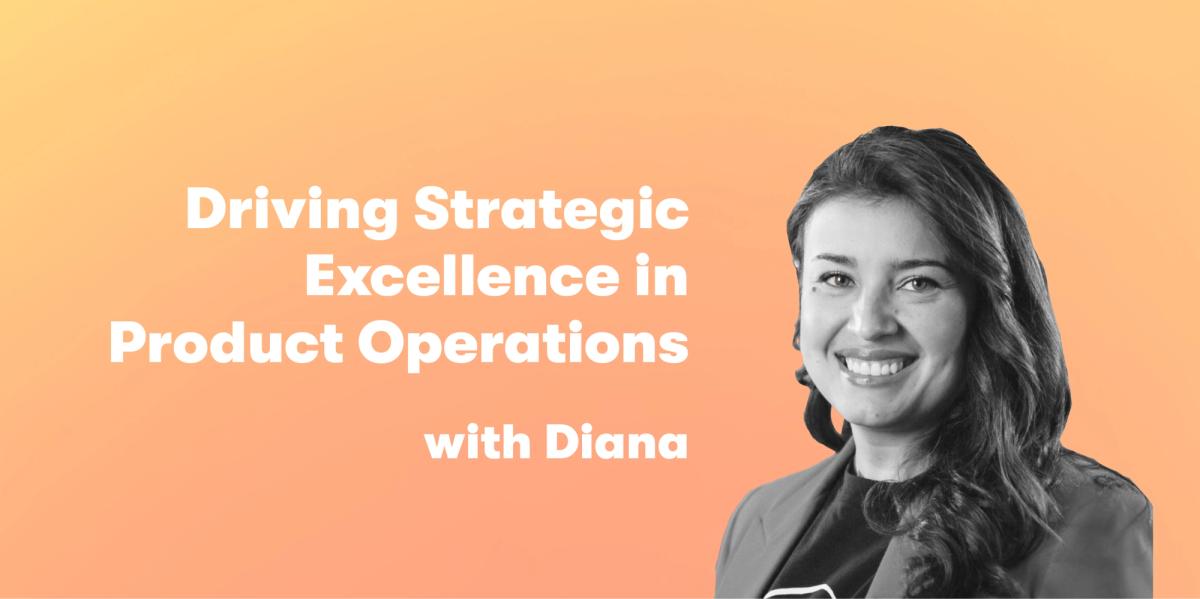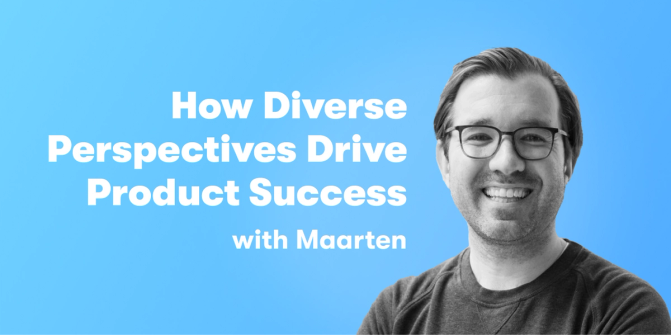Driving Strategic Excellence in Product Operations: An Interview with Diana Soler

Diana Soler, Director of Product Operations
In the dynamic world of product management, operational excellence is crucial for success. Behind the scenes, Product Operations teams work tirelessly to optimize alignment, communication, and collaboration between product teams and the wider organization. In this exclusive interview, we sat down with Diana Soler, Director of Product Operations at Assent, to delve into the strategic aspects of her role and gain insights into her experiences in driving business outcomes through effective product operations.
Can you share with us your background and how it has influenced your career in Product Operations?
Diana: I started my career in Business Development for Luxury Retreats which was acquired by Airbnb in 2017. Soon after the acquisition, we started working on creating the luxury category for Airbnb - now called Airbnb Luxe. This meant that we needed to pivot how we engaged with our hosts from a managed-service, white-glove style partnership to a product-led partnership.
This was no easy task and incredibly disruptive to our hosts. But if our hosts were to grow at the pace that the Luxe business was growing, they needed to engage with the product themselves (stop relying on our team) and we (in return) needed to create an incredible product experience for them - and help them fall in love with it.
I got to work every day with Product Managers, Engineers, Developers and Designers on crafting this experience - and this is how I fell in love with Product - the entire concept - the Product Development Lifecycle.
Once we launched this brand in 2019, I took the role of Program Manager. My team was responsible for educating the Luxe host on the product, its value, and how to use it.
In 2021, I joined AppDirect as Senior Product Operations Manager where I established & formalized Product Operations as a function. I developed a very clear vision for what product operations could be and how it could help product teams and product-led organizations bring teams together to ensure that we are executing data-driven strategies to keep customers happy with the product.
Today, I’m Director of Product Operations at Assent. Assent is on a mission to make the supply chains of complex manufacturers deeply and durably good. We built a platform dedicated to helping complex manufacturers bring responsible products to the world - from electronic to medical devices and aerospace, our platform helps ensure our customers comply with regulatory requirements from environmental regulations to human rights concerns.
I get to lead a team of 6 Product Operations specialists. Our team is responsible for Product Enablement, Product Operational Excellence, and Product Collaboration. Every day, we get to work with Engineering, Design, Product Management, Product Support, and Product Infrastructure to enable those teams to do their best work.
As a Product Operations leader, can you explain more about the responsibilities of Product Ops and what they aim to achieve?
The mission of our Product Operations team is to build and drive operational excellence within the product teams and help optimize alignment, communication, and collaboration between the Product organization and other teams across the org.
Our Focus Areas:
- Product Operational Rhythm - Maintain operational cadence of the product teams.
- Product Enablement - Improve product knowledge & engagement across the company. Product enablement helps employees gain relevant product knowledge.
- Product Operational Excellence - Improve the systems around the product teams.
- Product Collaboration - Improve how the product teams work across the org.
What Product Operations is NOT:
- Production Operations (releasing to environments)
- Delivery Management (frequency of deployment)
- DevOps (accelerate (& improve) process of deployment)
- a Project Management office
- a bandaid to do quick work for teams
- a catch-all for work with no clear ownership
What is the most significant challenge in Product Operations when it comes to saying "no," and how do you overcome it in practice?
In Product Operations, one of the most recurring challenges is the need to say "no" to certain requests or initiatives. This can be difficult because we aim to support and collaborate with various teams across the organization. Overcoming this challenge requires effective communication, transparency, and a focus on data-driven decision-making.
To address this, we ensure that our team is well-informed about the strategic priorities and overall roadmap of the company. This knowledge allows us to evaluate incoming requests and initiatives against these priorities. We emphasize the importance of aligning projects with our core focus areas to make informed decisions about resource allocation. By providing clear explanations and rationale behind our decisions, we foster understanding and build trust with stakeholders.
How do you set boundaries at work?
Setting boundaries is essential for maintaining a healthy work-life balance and maximizing productivity. Here's how we approach setting boundaries within Product Operations:
a. Clear Expectations: We establish clear expectations with our team members and stakeholders regarding working hours, response times, and availability. This helps manage expectations and prevents potential burnout.
b. Prioritization: We encourage prioritization and focus on high-impact tasks to ensure efficient use of time and resources. By clearly defining what tasks or initiatives should take precedence, we minimize unnecessary distractions.
c. Delegation and Empowerment: We empower team members to take ownership of their work and delegate responsibilities appropriately. This allows individuals to manage their workload effectively and avoid unnecessary work overlap.
d. Communication and Collaboration: We emphasize the importance of open communication within our team and with stakeholders. By fostering an environment where concerns can be discussed openly, we can address potential boundary violations promptly.
As someone with a broad range of experience, what do you consider the most valuable skills for adapting to new roles and industries?
Product Operations is still considered an emerging function and growing rapidly (especially in the last 3 years. And like anything new, it requires a combination of foundational skills and a growth mindset. Here are some valuable skills to cultivate:
a. Learning Agility: Embrace a continuous learning mindset and be open to new ideas, technologies, and industry trends. Adaptability is key in navigating unfamiliar territory.
b. Problem-Solving: Develop strong problem-solving skills to address new challenges effectively. This includes analyzing complex situations, breaking them down into manageable parts, and proposing innovative solutions.
c. Communication: Effective communication skills are crucial for collaborating with diverse teams, stakeholders, and customers. Being able to convey ideas clearly and actively listen to others fosters successful adaptation.
d. Flexibility and Resilience: Be flexible and resilient in the face of change and uncertainty. Adaptability often requires stepping out of your comfort zone and embracing new ways of thinking and working.
e. Cross-functional Collaboration: Cultivate the ability to collaborate across different functions and disciplines. This allows you to leverage diverse perspectives and skills when adapting to new roles and industries.
As a mentor and leader, what advice would you give to someone just starting out in Product Operations?
Product Operations (like many other emerging roles) is a journey of continuous learning, growth, and adaptability. Embrace challenges and seek opportunities to expand your knowledge and expertise. For someone just starting out in Product Operations (such as most of my team), I offer the following advice:
a. Learn and Observe: Immerse yourself in the Product Management field by learning from experienced professionals and observing industry best practices. Seek out mentors who can guide you on your journey. I dedicated at least 1 hour of learning per week and encourage my team to do the same.
b. Embrace Curiosity: Be curious and ask questions. Strive to understand the why behind decisions and actively seek to broaden your knowledge of different aspects of product development and the business of which you are part.
c. Focus on the Basics: Develop a strong foundation in core product development principles, including user research, market analysis, and product strategy. These fundamentals will serve as a solid base for your growth.
d. Be Customer-Centric: Always keep the customer at the center of your decision-making process. Understand their needs, pain points, and aspirations to build products that truly solve their problems.
e. Embrace Failure as Learning: Don't be afraid to take risks and learn from failures. Embracing a growth mindset allows you to iterate, adapt, and continuously improve.
f. Cultivate Soft Skills: In addition to technical skills, invest in developing your soft skills such as communication, collaboration, and leadership. These skills will help you navigate complex team dynamics and build strong relationships.
Where you can find Diana today
To learn more about navigating the world of Product Ops, you can follow Diana Soler on LinkedIn. There you can follow her journey as Director of Product Operations at Assent.




